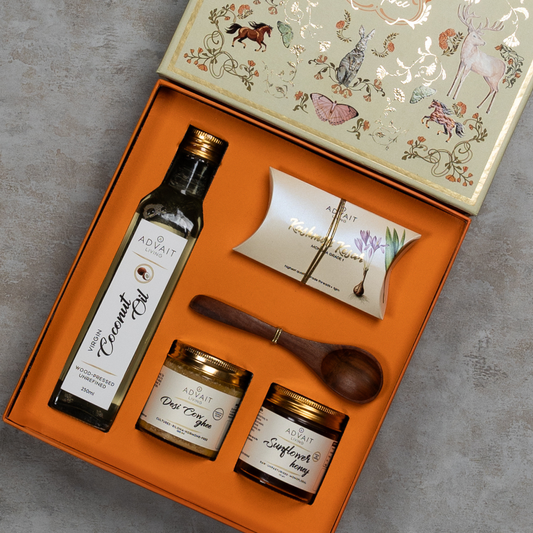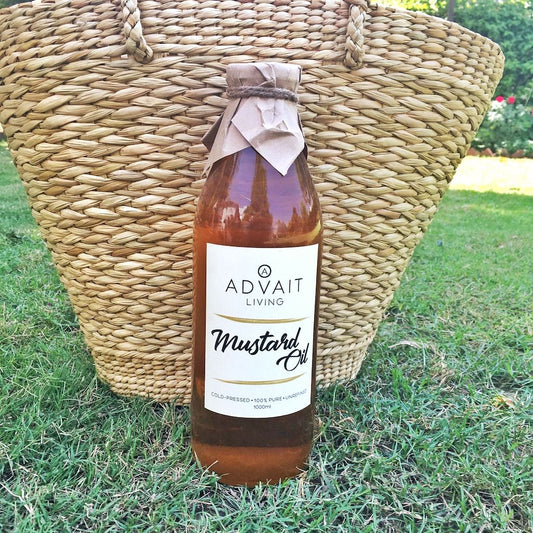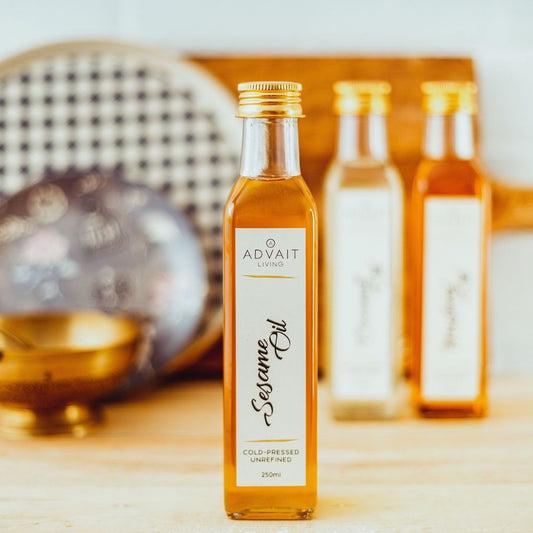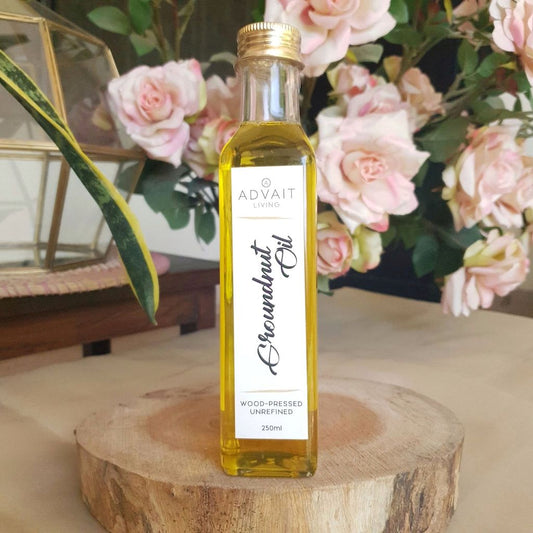Coconut - The God’s fruit
While the world is going gaga over its recent re-introduction to the coconut, India has been benefiting from this miraculous food since ancient times! In India, the ‘coconut palm’ is referred to as “Kalpavriksha” (“wish-fulfilling divine tree,” a holy and legendary tree thought to grant all desires) and in Sanskrit, the ‘coconut fruit’ is referred to as “Sriphala” (signifying “The God’s fruit”). Its antiquity is well deserved and can be traced to the post-Vedic works such as the epics Ramayana, Mahabharata (3000 BC), Puranas, and stories of Jataka in Buddhism.
Over the years, the coconut has been part of Indian traditions as a divine offering, as gifts to guests on occasions like festivals, marriage, and other ceremonies and as an integral part of the food & medicinal systems. Almost all parts of the coconut palm are useful to humans. The fruit is used as an essential food item, while the oil is used in cooking and has industrial applications. The fibre from the husk is used in the manufacture of cocopeat, coir ropes, mats and more. The leaves are used to make baskets, and even the wood from the tree is used for house construction and furniture making. It is perhaps no wonder, then, that coconut palm is looked upon with reverence in India. India is also the third largest producer of ‘Coconut’ in the world.
Ayurveda, the oldest surviving medical system of India about 5000 BC, mentions several uses of coconut, coconut oil and the coconut tree for the creation of medicinal and herbal applications to treat various illnesses. The ‘Bṛhat-Trayī’, literally translated as "The Great Triad" (which are the core texts in Ayurveda); outlines remedies for treating skin eruptions, inflammation, oral care, gastritis, headache, and even in treatment of cancer using different parts of the coconut. Coconut water is considered to be a cardioprotective, digestive stimulant, an aphrodisiac, anti-ageing and useful in the treatment of degenerative brain diseases like dementia and Alzheimer’s disease. Coconut oil is revered for its cosmetic, skin and hair care applications.
Even today, the coconut continues to have multiple applications in the modern world and in more recent times, the coconut oil is being claimed as one of the best edible oils in the world.
What is Coconut Oil?
‘Coconut Oil’ is naturally derived from the kernels of the coconut fruit. It is a clear and thin liquid (at room temperature) and transforms into a solid state during winter due to the presence of good saturated fats. Good quality, pure and unrefined coconut oil will have a distinct and pleasant coconut aroma, readily identifiable by most.
Composed almost entirely of fat, coconut oil boasts a unique fatty acid profile dominated by medium-chain triglycerides (MCTs). These fats offer advantages over traditional long-chain triglycerides, facilitating easier digestion and providing a quick source of energy. Its antimicrobial properties, moisturising capabilities, and rich antioxidant content contribute to its efficacy in skin care, hair care, and even health.
Multiple Uses of Coconut Oil
The ubiquitous coconut oil is found in nearly every Indian household and is used for several purposes:
1. Cooking:
Coconut oil is used in traditional recipes for deep-frying, sautéing, stir-frying, roasting, baking, seasoning, and curry preparation, particularly in South Indian and coastal cuisines.
2. Oil Pulling:
High-quality coconut oil used in oil pulling is linked to reduced plaque formation and gingivitis, creating a less favourable environment for harmful mouth bacteria.
3. Baby Massage:
High-quality and virgin coconut oil is commonly used for infant massage due to its mild, hypoallergenic properties. It nourishes the baby's delicate skin, helps prevent dryness, and is believed to have natural moisturising benefits, making it a gentle and safe choice for a baby massage.
4. Cosmetic benefits:
- Hair Care: Coconut oil is extensively used for hair care. It is applied to the hair and scalp to nourish, strengthen, and promote hair growth. Cold-pressed coconut oil prevents protein loss, nourishing hair and adding a lustrous texture.
-
Skin Care: Coconut oil is a safe moisturiser that increases skin hydration, suitable for babies and adults. It prevents pigmentation, lightens wounds, and maintains youthful, flawless skin.
5. Medicinal Benefits:
- Antimicrobial Properties: Cold-pressed coconut oil, rich in medium-chain fatty acids (MCFAs), exhibits antimicrobial activity, combating bacterial and fungal growth.
- Anti-Inflammatory Effects: Compounds like polyphenols and lauric acid in cold-pressed oil may help mitigate inflammation in the body.
- Wound Healing: Topical application promotes faster healing due to increased collagen production, with antibacterial and antifungal properties reducing infection risks.
6. Weight Management:
Medium-chain triglycerides (MCTs) in cold-pressed coconut oil may promote fat oxidation, reduce body weight, increase metabolic rate, and create a sense of satiety, leading to lower calorie intake.
7. Heart Health:
Regular consumption of cold-pressed oil can improve cardiovascular health by enhancing lipid profiles, boosting HDL (good cholesterol), and reducing LDL (bad cholesterol).
How to Identify a High-Quality Coconut Oil?
Identifying high-quality coconut oil is crucial for reaping its full nutritional and therapeutic benefits. With the plethora of brands offering numerous benefits, navigating the market for coconut hair oil can be overwhelming. We have broken down a few key aspects that you must keep in mind while choosing a coconut oil that fits your requirements.
I. Types of Coconut Oils
There are many types of coconut oils available in the market. And it is important to understand the difference between these oils. The most important differentiator is the extraction method employed to obtain the coconut oil as it significantly impacts the quality of the oil, influencing its flavour, nutritional content, and overall characteristics. Also, different types of extraction methods result in varied types of coconut oils. Each type of oil will have different nutritional values and is suited for different applications.
1. Virgin Coconut Oil (VCO):
Virgin Coconut Oil is also called ‘raw, unrefined or cold pressed’ coconut oil. It is obtained from fresh coconut meat by mechanically pressing them usually on a traditional wooden (or stone) chekku/ghani and without the use of any toxic heat or chemical solvents. It is called ‘virgin’ mainly because it is ‘single pressed’ without repeated pressing of the seeds for extraction of additional oil. This makes it one of the highest-quality oil and is often ranked as “Grade A” oil.
- Virgin coconut oil or cold-pressed coconut oil is naturally sedimented for a couple of days before it is filtered by a cheese cloth and packed in a glass bottle. This method preserves the natural integrity of the oil yielding a fresh & aromatic oil.
- The minimal application of heat during extraction also helps preserve the oil's original flavour, aroma, and nutritional content, including medium-chain fatty acids (MCFAs) like lauric acid, phytonutrients, antioxidants, and beneficial compounds.
- It is usually multipurpose and can be used for cooking, massages and even cosmetic use.
2. Extra Virgin Coconut Oil:
Extra Virgin Coconut Oil is extracted from fresh coconut milk. It is often cited as a higher quality oil, even more than ‘virgin coconut oil’. The extraction of this oil is very different and it comes from coconut milk instead of coconut kernels. Fresh coconut milk is, at first, extracted by the grinding of coconut pieces together and sieving the milk through a cheesecloth. The oil can be obtained from the milk via two methods:
- Cold Pressed: In the cold-pressed extraction method - the extracted coconut milk is introduced into a centrifugal machine. The rapid spinning of the machine separates the coconut oil from the milk. This is due to the centrifugal force generated by the machine. Once the oil has separated, it is naturally sedimented and filtered carefully to obtain pure and pristine coconut oil.
- Heat Application: Under the heat extraction method, the coconut milk is heated till the oil separates from the milk. This oil is then filtered, packed and made available to the consumer.
- Of the above two, ‘cold-pressed extra-virgin coconut oil’ is considered of a higher quality. It is typically much thinner and lighter than virgin coconut oil. The extraction method to yield extra-virgin coconut oil results in very little coconut oil and hence it is much more expensive than all other types of coconut oils.
3. Refined Coconut Oil:
Unlike virgin or extra-virgin coconut oil, commercially available refined coconut oils are derived from oil cakes rather than coconut flesh. It is subjected to an extremely intense physical or solvent extraction procedure in which seeds are heated to high temperatures of up to 700 °C and repeatedly crushed to extract maximum oil. Several processes are employed to ‘refine’ the oil of impurities such as washing, deodorization, and bleaching, among others. When compared to cold-pressed coconut oil, the resulting oil has a more neutral taste.
- It generally has a higher smoke point and a more neutral flavour, making it suitable for cooking at higher temperatures.
- The refining process of this kind of oil results in the loss of some phytonutrients and antioxidants, potentially reducing the overall nutritional content compared to cold-pressed varieties.
4. Fractionated Coconut Oil:
Fractionated Coconut oil is also referred to as ‘Coconut MCT Oil’. This is a type of coconut oil where long-chain fatty acids are deliberately removed, leaving only medium-chain triglycerides (MCTs). Such type of oil is usually extracted by heating the coconut oil above its melting point. Then, it's left to cool. Once the temperature falls, the lauric acid and long-chain fatty acids (in the oil) turn solid faster than other types of fat, which allows them to be separated and removed, leaving behind a clear and odourless liquid called ‘MCT Oil’. Studies suggest that MCT oil has skin benefits and may also aid in weight loss.
5. Hydrogenated Coconut Oil:
Hydrogenated coconut oil is obtained by introducing hydrogen atoms that turn the unsaturated fat components of the coconut oil into saturated fats. This oil is usually solid at room temperature and is often used in the food industry for certain applications. This also has a longer shelf life as it prevents quick spoilage. Partially hydrogenated coconut oils may have the presence of harmful trans-fats.
II. Nutritional Profile
Studies show that unrefined coconut oil has higher antioxidants, phytonutrients and polyphenols that contribute to many health benefits, such as cancer prevention and anti-inflammatory properties, than refined coconut oil. Several studies show the antimicrobial, anti-inflammatory and skin-protective properties of virgin coconut oil. It is also rich in vitamin E, vitamin K, and a specific type of saturated fat called medium-chain triglycerides, or MCTs. More specifically, it is loaded with an MCT called lauric acid that can help control the balance and distribution of bacteria in the human gut microbiota.
On the other hand, refining, bleaching or deodorising of coconut oil reduces unsaturated fatty acids like oleic and linoleic acids and some micronutrients like tocopherol and sterol and in general reduces nutritional benefits, taste and aroma of refined oil.
III. Oxidative Stability
Whilst choosing a cooking oil, the ‘smoke point’ of an edible oil is considered to be the most sought-after quality indicator. However, not only do smoke points have little relevance in home cooking, but they also do not shed light on the stability of the oil under heat.
When heat is applied to an oil, the oil starts to degrade and undergoes chemical changes. This produces many by-products, some of which have adverse effects on health. It has long been held that the ‘smoke point’ of an oil predicts the safety and stability of the oil under heat; however, new evidence suggests otherwise.
A study in 2018 considered several edible oils and evaluated the chemical and physical changes in different edible oils when heated. It found that ‘oxidative stability’, production of secondary products of oxidation (such as free radicals, trans-fatty acids), and total level of PUFAs are far more reasonable predictors of how an oil will perform when heated. These would be far more useful parameters to consider while evaluating the safety of an oil.
1. Smoke Point:
Smoke point is the temperature at which an oil begins to smoke continuously and can be seen as bluish smoke. The smoke indicates a chemical breakdown of the fat (oil) to glycerol and free fatty acids (FFAs). The glycerol is then further broken down to acrolein (2-propenal), which is one of the main components of the bluish smoke. Smoke point is affected largely by FFAs present in the oil. The FFAs, in turn, are impacted by the extraction method of the oil and the duration of heat applied. The study found that a longer duration of heating (upwards of 6 hours) has more impact on FFAs in natural oils than higher temperatures of heat.
2. Oxidative Stability:
If you are considering coconut oil for its culinary application with added nutritional benefits, it would be wise to choose unrefined, virgin/extra-virgin coconut oil.
IV. Absence of Trans Fats
Trans fats exist in two forms: naturally occurring in ruminant animals and artificially produced. While natural trans fats are considered safe in reasonable amounts, artificial trans fats can contribute to health concerns.
There is a remarkable difference between trans-fat content in refined oils and non-refined oils. Unrefined and raw oils are naturally low in trans-fat, and the simple mechanical extraction method for virgin oils does not lead to the production of trans fat. However, refined oils are extracted using several methods that may produce trans-fats in the oil. Even partial hydrogenation of coconut oil creates trans-fats, which are associated with heart disease, weight gain, obesity, and stroke and hence must be avoided.
Choose a high-quality raw & unrefined coconut oil which has negligible or zero trans-fat. Both virgin and extra virgin coconut oil, preferably cold-pressed, are good choices.
V. Blended Oils
Blending of oils is done for several reasons, including cost reduction or even to offer therapeutic benefits. If you want pure coconut oil, without any mixing, make sure to read the label and check the list of ingredients. The only ingredient that must be present is ‘coconut oil’. If you are looking for blended oils for specific purposes, such as dental care, choose a brand that offers coconut blended oils which clearly outline the various ingredients used and their benefits. However, it's best to avoid blended oils with refined and ultra-processed ingredients for the best therapeutic benefits.
VI. Presence of Preservatives
It’s long been established that chemical additives and preservatives may have several harmful health impacts. It is best to seek out cold-pressed and natural oils, free from additives or chemicals. In its liquid form, unrefined coconut oil is colourless and clear. If coconut oil is tinted, it may contain additives that may or may not be suitable for your health.
VII. Artificial Perfume
Avoid oils with artificial perfumes, as most of these are derivatives of petroleum and may have a negative impact on health.
VIII. Freshness of the oil
Check the label for the freshness of the oil, as they have maximum nutrition and bioavailability of macro & micronutrients. Choose brands which produce in small batches, as that ensures you get access to the latest batch of oils. Unrefined coconut oil will usually have a very pleasant aroma that mimics a fresh coconut. To increase the shelf life of your coconut oil, store it in the fridge for up to two years. Very old or rancid coconut oil will degrade and the colour & aroma will reflect accordingly.
IX. Multipurpose or Single-purpose
The highest grade of coconut oil - virgin or extra-virgin coconut oil - is always multipurpose. You can use them for several purposes, including consuming raw for medicinal benefits, cooking at different temperatures, and drizzling on your salads or adding them to your coffee. For skincare routines or baby massages, it is always best to choose virgin or extra-virgin pure coconut oil that is sure to nourish the skin and avoid any harmful side effects.
X. Packaging Material
It is best to choose coconut oils in glass jars where they are cold-pressed or refined. This is so because glass jars are safer to store food ingredients and do not leach, unlike plastic jars. They are also more sustainable because they limit plastic consumption and are reusable.
XI. Source or Origin
Opt for coconut oil that is sourced from local farms in India, ideally practising organic and sustainable farming methods. This choice helps support the growth of local ecosystems and minimises the carbon footprint associated with imported coconut oils. Sustainable agriculture also promotes good organic practices that eliminate the use of synthetic pesticides and fertilisers, increasing the nutritional availability of your oil.
Conclusion
Choosing the right coconut oil can be a significant decision due to its diverse applications and potential health benefits. By taking the time to understand the available options and making an informed and well-rounded decision, you can reap the full benefits that coconut oil has to offer.
Indians have been using traditional wooden ghani coconut oil (cold-pressed oil) for centuries. It is also called "raw and unrefined oil". Cold-pressed coconut oil is heat-stable, nutrition-dense, and loaded with good saturated fats. It is versatile and has an impressive track of applications in cooking, beauty rituals and ethnomedicine. Look for terms like "virgin," "extra virgin," "cold-pressed," "wood-pressed," or "unrefined," as they indicate minimal processing and preserve more natural nutrients and flavour.
Remember to prioritise quality!
Frequently Asked Questions
1. What is the difference between virgin and refined coconut oil?
Virgin coconut oil, extracted through natural methods like cold pressing, retains more nutrients and flavour.
Refined coconut oil undergoes additional processing like bleaching and deodorising, resulting in a neutral flavour and a higher smoke point.
2. Which type of coconut oil is best for health?
Virgin and cold-pressed coconut oils are generally considered healthier due to their higher nutrient content.
3. What is the difference between organic and non-organic coconut oil?
- Organic: grown without synthetic pesticides and fertilisers.
- Non-organic: may contain residues of pesticides and fertilizers.
4. How can I tell if coconut oil is rancid?
Rancid coconut oil will have a strong, unpleasant odour or a bitter taste. Discard rancid oil, as it can be harmful to consume.
5. How should I store coconut oil?
Store coconut oil in a cool, dark place, ideally in a dark glass or opaque container. To increase shelf-life, store in the refrigerator for up to two years.
6. Can I cook with coconut oil?
Yes, coconut oil is a versatile cooking oil with high oxidative stability, making it suitable for various cooking methods like sautéing, baking, and frying. However, the strong coconut flavour may not be suitable for all recipes.
7. What are some common uses for coconut oil?
- Cooking (frying, baking, etc.)
- Skincare (moisturiser, makeup remover, etc.)
- Hair care (hair mask, conditioner, etc.)
- Wound healing
- Oil pulling
8. Are there any side effects of using coconut oil?
While generally safe for consumption, coconut oil is high in saturated fat. It is recommended to consume coconut oil in moderation as part of a balanced diet.


























